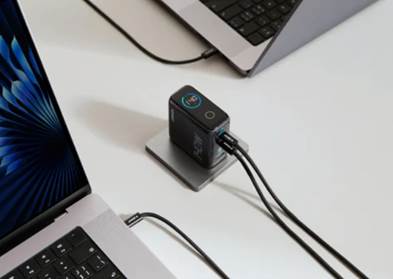Selecting the right
laptop charger ensures your device is powered efficiently and safely. With
various options available, knowing which charger meets your laptop’s
requirements can be challenging. Whether it’s understanding wattage,
compatibility, or the different types of charging ports, a thoughtful approach
to choosing a charger will keep your device running smoothly and extend its
lifespan.

Why Choosing the Right Laptop
Charger Matters
The Risks of Using the Wrong Charger
Using an incorrect charger can lead
to multiple issues. An underpowered charger may cause your laptop to charge
slowly or not at all. On the other hand, overpowering your device with a
charger that has a higher voltage can damage your laptop’s battery and internal
components. Beyond performance issues, using the wrong charger poses safety
risks, including overheating and potential electrical fires.
How the Right Charger Improves
Performance and Safety
Choosing a compatible charger
significantly enhances your laptop’s performance and longevity. With the
correct wattage, your laptop can charge quickly and efficiently. Safety
features such as overvoltage protection and temperature control within a charger
prevent damage and minimize risks associated with overheating. A reliable
charger maintains the health of your battery and ensures optimal performance
during use.
Understand Your Laptop’s Charging
Requirements
Check Your Laptop’s Wattage and
Voltage Needs
Before selecting a charger, verify
the wattage and voltage specifications for your laptop, usually found in the
user manual or on the original charger. Matching these specifications with your
charger ensures compatibility. The wattage determines how fast your computer will charge, while the voltage
must match your device’s requirements to avoid damaging the battery.
Know Your Charging Port Type:
USB-C, MagSafe, Barrel Plug
Laptops come equipped with
different types of charging ports, including USB-C, MagSafe, and barrel plugs.
Identifying your laptop’s port type is crucial for compatibility with the
charger. USB-C ports are increasingly popular due to their versatility, supporting
fast charging and data transfer. MagSafe, commonly found in Apple laptops,
offers a secure magnetic connection. Barrel plugs are traditional connectors
used in many older laptop models.
Key Features to Look for in a
Laptop Charger
Power
Output and Wattage Ratings
Ensure the charger’s power output
and wattage ratings match your laptop’s requirements. This information can
typically be found on the original charger or in the laptop’s specifications. A
charger with appropriate power output ensures efficient and quick charging,
preventing slow charge times or potential damage to the battery.
Certified Safety Features:
Overvoltage and Temperature Control
Safety-certified chargers provide
peace of mind. Look for features like overvoltage protection, which prevents
your laptop from receiving too much power, and temperature control systems that
monitor and regulate heat to avoid overheating. These features are crucial for
maintaining the safety and longevity of your laptop and its battery.
Portability and Build Quality for
Daily Use
Consider how portable and durable
the charger is, especially if you frequently travel with your laptop. A
compact, lightweight charger is convenient for on-the-go use. Additionally,
robust build quality ensures the charger withstands daily wear and tear.
Investing in a high-quality charger guarantees reliability and durability.
Why Products Like Anker’s USB-C
Laptop Chargers Stand Out
Anker is a leading provider of
high-end charging solutions, offering a wide range of laptop chargers
compatible with various devices. Their exceptional products, such as the Anker
140W, 4-Port PD 3.1 USB-C Laptop Charger, ensure a smooth and rapid charging
experience. Anker’s advanced ActiveShield™ 2.0 technology continuously monitors
temperature and adjusts power output, prioritizing device safety. With
unmatched charging performance and consistent reliability, Anker chargers are a
trustworthy choice.

Common Mistakes to Avoid When
Buying a Charger
Ignoring Compatibility and Power
Ratings
One common mistake is overlooking
the charger’s compatibility with your laptop. Always check the wattage,
voltage, and port type to ensure it matches your device. Using an incompatible
charger can lead to inefficient charging and damage to your laptop’s battery or
internal components.
Choosing Cheap, Non-Certified Chargers
Opting for inexpensive,
non-certified chargers can be risky. These chargers often lack essential safety
features and may not meet industry standards, potentially leading to
overheating, short-circuiting, and damage to your laptop. Investing in
certified chargers ensures safety and reliability.
Overlooking Cable Quality and
Connector Type
Pay attention to the quality of the
charging cable and the connector type. Poor-quality cables
can wear out quickly and fail to provide stable connections. Ensure the charger
includes a durable, high-quality cable with the correct connector type for your
laptop. Quality cables enhance performance and reduce the risk of damage.
Conclusion
Choosing
the right laptop charger involves understanding
your laptop’s requirements, prioritizing compatibility and safety features, and
avoiding common mistakes. By selecting a charger that meets your device’s
specifications and investing in quality brands like Anker, you can ensure efficient,
reliable, and safe charging. A well-chosen charger not only protects your
laptop but also enhances its performance, providing you with the optimal user
experience.
